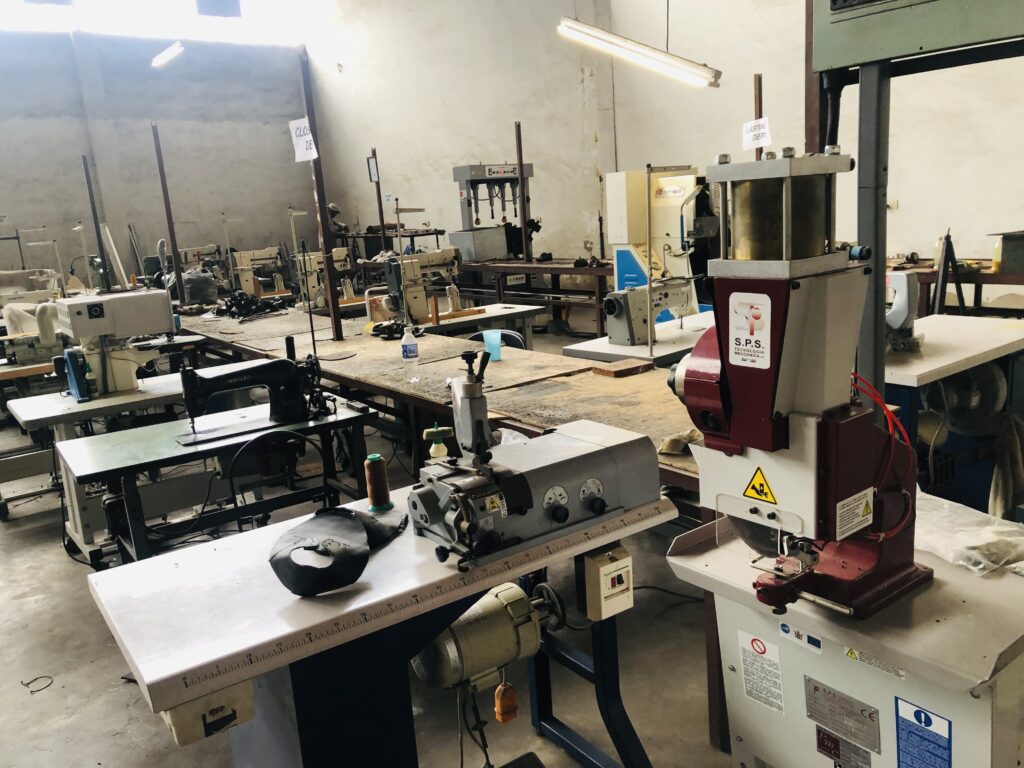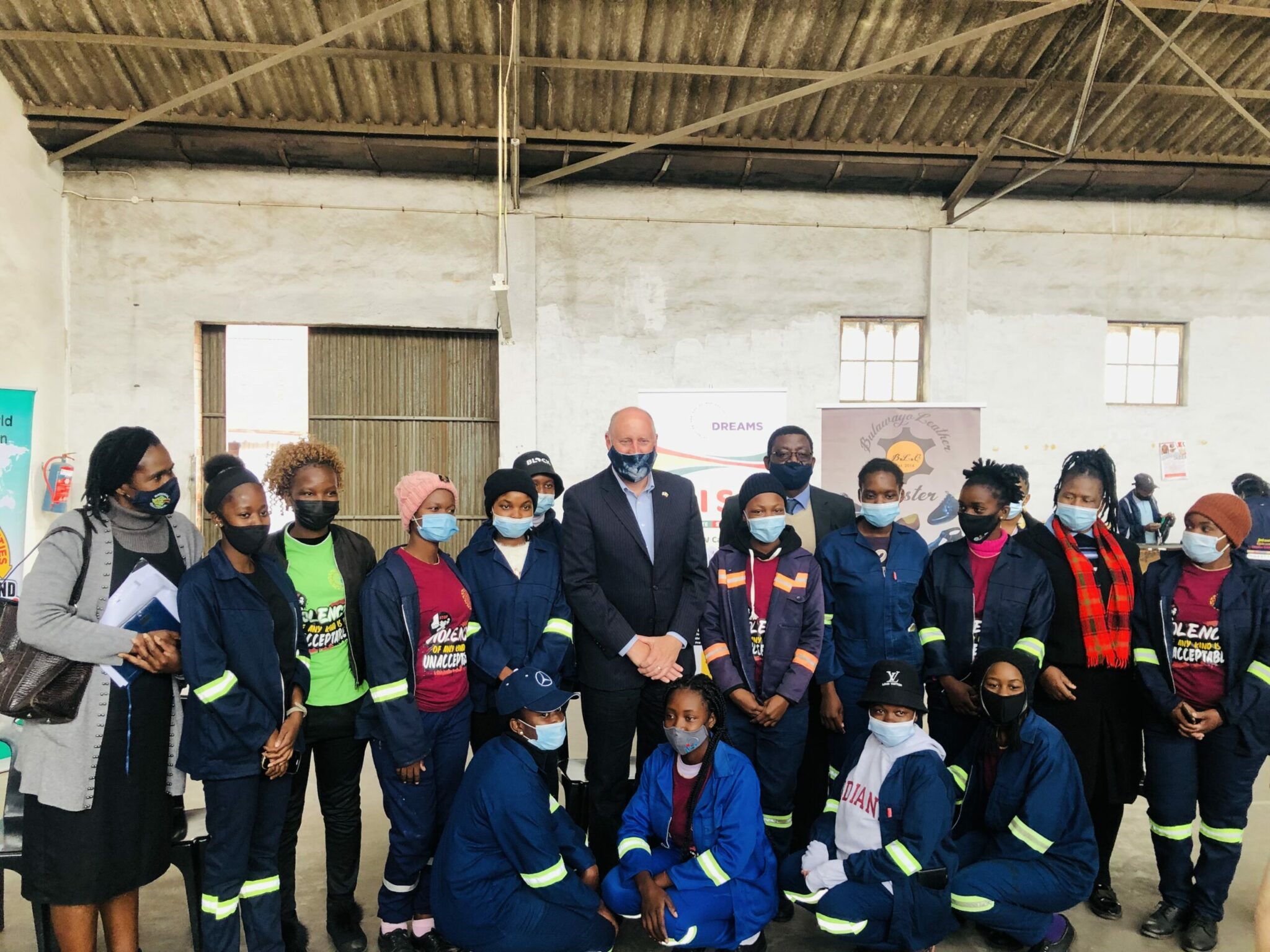A group of young entrepreneurial women in Bulawayo are making their mark in the leather industry as they received a tender to supply shoes to Namibia.
From their humble beginnings, where most of them were unemployed and economically suffering, these young women are now part of the Bulawayo Leather Cluster, where they produce leather products such as shoes, sandals and belts for export.
These young women are now breadwinners in their respective homes.
Most of these girls received vocational training under the Determined, Resilient, Empowered AIDS-Free, Mentored and Safe (DREAMS) project, which although a health intervention to stop the prevention of HIV and AIDS, has grown to offer skills upgrading for members to be sustainable.
The DREAMS project is one of the initiatives supported by the United States President’s Emergency Plan for AIDS Relief (PEPFAR) which was visited by the United States Embassy Charge d’ Affairs (CDA) Thomas Hastings in Bulawayo Tuesday.
One of the young women, Pamela Mbewe, narrated that before she joined the leather cluster, her life was unbearable.
“I was raised by a single mother. We did not have much at home so I had to drop out of school when I was in A’ level. I became a maid then I joined DREAMS and we were given options either to be employed or go for vocational training. I opted for vocational training and that’s where I was attached to the Bulawayo Leather cluster and taught to produce shoes,” she said.

Mbewe said after three months of training, members were given a fixed allowance, which she used to start producing shoes.
“I bought materials and, in a weeks’, time made 10 pairs of shoes including sandals. I used R300 to buy materials then I sold the shoes at R100 a pair and that gave me R1000, money which I used at home as I was now the breadwinner,” she stated.
“The other money went into my savings and I hope to continue studies, do some IT, marketing and advertising. I want to design my own shoes, have my own brand by using and by using digital skills, market and advertise my shoes.”
Secretary of the Bulawayo Leather Cluster, Fungai Zvinondiramba, said this project was established in 2014 and has been training girls.
“Historically the leather industry has been a male-dominated industry. DREAMS took this opportunity, identified girls from communities and brought them to us for training so they understand the leather value chain in Zimbabwe. We give them skills to make the product and we are training them to be entrepreneurs,” he said.
“We want them to take over this place one day. I won’t be here in the next 10 years as nature and age is catching up with the team. Our vision is for the girls to take over and move forward with this initiative because they are young, innovative and make better products.”
Zvinondiramba said he had an opportunity to visit Ethiopia and was amazed to see the leather value chain was run by women.
“We want to take advantage of this support and make sure these girls become the next generation of people who are going to control the leather value chain. We are working with the Ministries of women and youth. The aim is to get exposure not only to the market in Zimbabwe but to the regional market as well,” he noted.
“There is only one place where you will never be lied to, it’s the marketplace, the market will always tell you the truth, either your product is not good or is not good. Some of the products you have seen were developed after the girls were exposed at the (just ended Zimbabwe International Trade Fair) ZITF.”
Dominica Mringi from the Ministry of Women Affairs, Community, Small and Medium Enterprise Development added it was pleasing to see young girls becoming sustainable.
“As a ministry, our focus is women and child empowerment. At the ZITF, the Ministry of SMEs booked 27 stands for entrepreneurs and one of the stands was for the Bulawayo Leather Cluster to showcase their products and they won a tender to provide leather shoes to Namibia. These young girls must work tirelessly and send leather shoes to SADC,” she said.
After touring the site, the US envoy said it was encouraging to see projects reaping good rewards.
“We work across all over Zimbabwe, working with partner organisations on projects like these and it is a great opportunity for me to see this,” Hastings said.
Hastings also highlighted that the leather cluster may not look like a public health project but is considered as a health benefit.
“This is part of our efforts to make sure these girls have opportunities. This is industry and private sector but it is interesting to see the extent of our work, to say we are doing HIV AIDS prevention but it goes so far to say that it’s not just preventing HIV giving them medicine but it making sure girls have opportunities,” he said.
“I am pleased to see the private sector cooperating with these clinic partners and government to make a sustainable outcome for these girls. We can’t give them something then send them on their way but have to give them skills to develop and take control. That’s what is happening here.”

